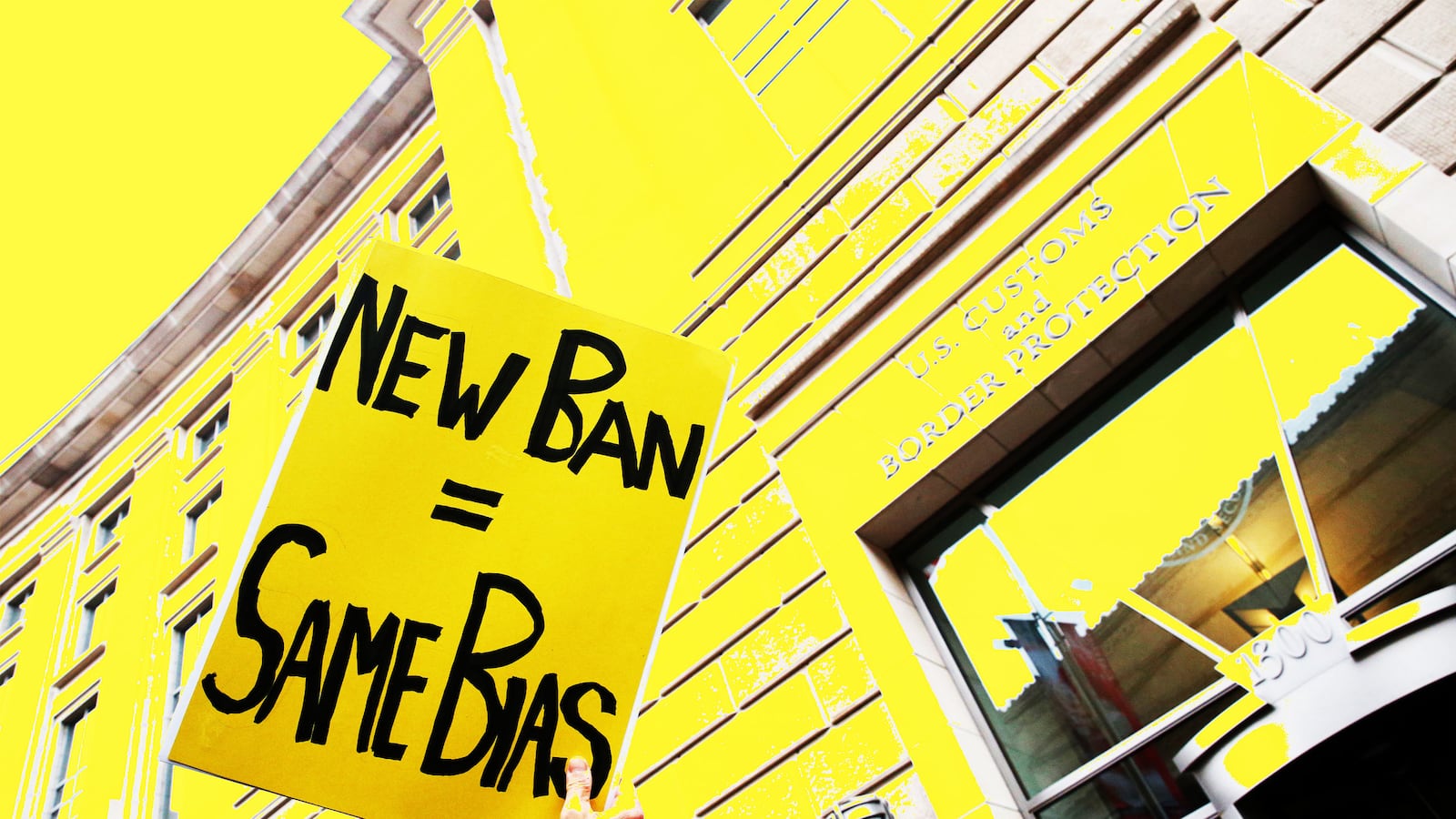The biggest problem for President Donald Trump’s travel ban is President Donald Trump.
That became excruciatingly evident when he gave a stream-of-consciousness reaction to an overflow crowd in Nashville at a campaign-style rally Wednesday night after a federal judge in Hawaii blocked implementation of his new ban nationwide and just hours before it was to take effect.
“This is a watered-down version of the first one,” he proclaimed––inadvertently bolstering his critics’ arguments that both bans were informed by the same anti-Muslim animus and, thus, were in violation of the First Amendment.
Justice Department lawyers have worked overtime to argue that neither of the president’s executive orders––not the first one, which kicked off airport chaos before judges blocked it, and not the second one, which would have gone into effect just after midnight if another federal judge hadn’t given it the same treatment––were Not. Muslim. Bans.
Those lawyers have pointed out that the vast majority of Muslims in the world weren’t impacted by either ban, that the the president has broad legal authority when it comes to immigration, and that previous presidents also unilaterally blocked travelers from entering the United States based on their nationality.
But the arguments those lawyers made in court were systematically hamstrung by the president and his aides.
Now, it didn’t help that Trump campaigned on a Muslim ban, arguing with passion that any Muslim travel to the U.S. posed a grave and immediate threat. And it didn’t help that his campaign site––as of the evening of March 15––has up a press release calling for that ban.
Those were facts that federal judges cited in previous rulings enjoining the first version of Trump’s ban.
On top of that, though, were comments Trump and his allies made after he became president. Rudy Giuliani famously told Fox News that Trump asked him how to craft a ban that would pass legal muster––an comment that, ironically, made it much harder for Trump’s order to get through the courts––and Stephen Miller, one of his top White House advisors, also told Fox News that the second travel ban was only slightly different from the first.
Then there’s the fact that Trump himself told CBN’s David Brody he would craft policy to give preferential treatment to Christian refugees over Muslims.
And now, even before the ink had dried on the Hawaii decision, Trump was blithely undercutting its legal basis.
“I wasn’t thrilled, but the lawyers all said ‘Oh let’s tailor it,’” he told the crowd. “This is a watered-down version of the first one. This is a watered-down version. And let me tell you something, I think we ought to go back to the first one and go all the way, which is what I wanted to do in the first place.”
The lawyers arguing against Trump will almost certainly cite that line.
“As long as he himself continues to tie these orders together, then the courts can, should, and must rightfully consider all of that rhetoric that went before it,” Hassan Ahmad, an immigration lawyer based in Northern Virginia who volunteered at Dulles Airport to help travelers impacted by the first order, told the Daily Beast. “A court would look at that and say, ‘Well, you’re still trying to ban Muslims, you’re still disfavoring a religion. You violated the Establishment Clause, and now you just admitted it.’”
The Establishment Clause, in the First Amendment of the Constitution, blocks the government from giving people better or worse treatment based on their religious beliefs. Opponents of the president’s order argue it was designed to do just that––to discriminate against people because they’re Muslim.
In his ruling blocking the ban, District Judge Derrick Watson said that just because it doesn’t apply to all Muslims doesn’t mean it isn’t discriminatory.
“The notion that one can demonstrate animus toward any group of people only by targeting all of them at once is fundamentally flawed,” he wrote. “The Court declines to relegate its Establishment Clause analysis to a purely mathematical exercise.”
The judge then proceeded to cite the press release mentioned earlier, along with Miller and Giuliani’s public comments, as evidence of the new order’s religious animus.
So far, none of his court losses have stopped Trump from doubling down after each loss on his legally disastrous rhetoric.
“SEE YOU IN COURT,” he tweeted when an appellate panel first upheld the block on the ban.






